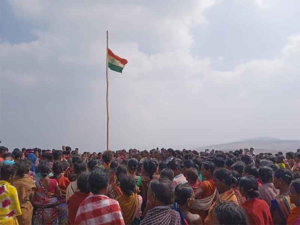[Gujarat chapter of India’s top civil rights network, National Alliance of People’s Movements (NAPM), drawing a parallel between the recent suicide of Darshan Solanki, a Dalit student of Indian Institute of Technology, Bombay, and of Rohith Vermula in 2016, has in a statement called it as another “institutional murder” resulting from “crass caste discrimination” prevailing in India’s elite educational institutes.]
Text of Statement:
We, the members of the National Alliance of People’s Movements, Gujarat, are distressed by yet another alleged suicide of a brilliant young Dalit Student of Mumbai IIT, Darshan Solanki from Ahmedabad. Darshan was a first-generation student, the son of Rameshbhai, a plumber and Tarlikaben, a domestic worker.
This ‘suicide’ cannot be seen in isolation from the significant number of such ‘suicides’ that have been happening in a number of premier academic institutions in the country. Rohit Vemula’s institutional murder was perhaps the only instance among many which exposed the casteist underbelly of the elite IITs, IIMs, NITs, Central Universities, and premier medical colleges. We cannot also ignore the circumstances in which Aniket Ambhore, another Dalit student in IIT Mumbai committed suicide in 2014, following which an inquiry committee (A.K. Suresh Committee) appointed to look into the suicide reached the conclusion that his death was due to the discriminative atmosphere prevailing on the campus. Despite this damning report, the institute still did not institute the mandatory SC-ST Students’ Cell on campus till 2022.
Dalit-Bahujan students like Darshan reach these ‘premier’ institutions overcoming caste and economic barriers at every level. Their parents come from humble backgrounds, many of whom migrate to cities to escape the crass caste discrimination, violence, and economic exploitation in the rural areas, only to find that caste hounds them in the cities too – in terms of the residential locations, access to education, health and livelihood opportunities. Their very spatial location in the city determines the kind of work they can aspire for; the kind of schools that their children can go to; the kind of basic amenities and civic services they can expect. Despite all this they struggle day in and day out to give their children an education inspired by the dream that our Constitution holds out to all citizens regardless of caste, creed, or gender. It is this dream of equality and faith in the Constitution that enables them to crack the JEE and similar entrance mechanisms and finally secure admission, despite not having that initial advantage of being educated in elite schools or having been trained in expensive coaching centres.
But what awaits them in these institutes is a highly hostile, casteist environment; expressed mainly through anti-reservationism that reeks of hatred and contempt for students coming in through reservation. It is important to realize that it is not just a cultural or language barrier; they face ridicule, insults, hatred, and exclusion all the time from ‘privileged’ students, and more seriously, from the faculty too. It is important to note that the privileged students form the majority (almost 50%) of the student strength in these institutes, while Dalit and Adivasi students and faculty would form only a maximum of 24-25%, and hence in a minority (even assuming that all the reserved seats are filled). The ‘mainstream’ of these institutes would be dominated by the ‘privileged’ students, leaving Dalit-Adivasi students feeling excluded, humiliated, and scarred. Although there are mechanisms like the SC-ST Students Cells formed in these institutes, they are powerless and mostly ill-equipped to detect and eradicate this uncivilized and criminal casteist mindset that is prevalent. Hence when these state of affairs lead to suicides it can be described as nothing short of institutional murder.
It is quite likely that Darshan Solanki’s alleged ‘suicide’ is an institutional murder. The extenuating circumstances clearly points towards that possibility:
- Darshan had once told his family members that he did face discriminatory behaviour on campus on account of being Dalit, but he did not want to dwell on it but wanted to focus on his studies. United Student Movement in its update mentions that “Darshan was facing caste discrimination on campus after his rank (an indicator of the category he was admitted under) became known to his classmates and ward residents. Not only did his peers stop speaking to him, a teacher also allegedly told him that he was ‘unfit’ for IIT Bombay.”
- Despite not being from a privileged background, Darshan managed to secure admission to the IIT, and hence his academic capability and ability to work hard despite adversity is not in question. Work pressure in the IIT could not have broken him and forced him into suicide.
- A senior student from the same IIT stated in an interview in a news channel that Darshan could well have committed suicide due to caste-based discrimination on campus.
- According to a professor who met Darshan’s maternal uncle there was another student who was an eyewitness to Darshan jumping to his death. However, the parents and relatives were not allowed to meet and talk to this student.
- The administration of Mumbai IIT was fast to deny any form of caste discrimination and institutional murder. Such premature, firm denial even before an investigation is a definite indication of the prevalence of such an environment on campus.
- It was just 8 years ago that Dalit Student Aniket Ambhore committed suicide in Mumbai IIT. The inquiry committee that was appointed to look into it did find that caste discrimination was a significant factor that led to Aniket’s suicide. The lackadaisical attitude of the administration of Mumbai in instituting the SC-ST Students’ Cell even after that finding reveals the insensitivity of the administration.
- A report in “The Wire” reveals the serious lapse (read active casteist mindset) of the administration with regard to paying attention to the mental health of students: “…Several student organisations functional on campus have been negotiating with the cell to focus on Bahujan students’ concerns – mental health being one of the most urgent ones. A senior professor, on the condition of anonymity, says the cell had in fact conducted a survey a few months ago. ‘Over 20% of the SC-ST students had participated in this survey. The cell, we are told, has identified at least 15-20 students who are in dire need of help. The administration is aware of this. Yet, there has been no intervention on their part,’ the professor said.”
- The same report of “The Wire” also reveals the shocking anti-reservationist mindset of the Head Counselor of the Student Wellness Centre of IIT Mumbai, as found in a tweet of hers. It is anybody’s guess what the Student Wellness Centre headed by such a counsellor can do to counter the psychological harm done to Dalit-Bahujan students by the dominant casteist and anti-reservationist culture on campus.
- It is pertinent to note here that the United Student Movement of the Mumbai IIT has long demanded for caste-sensitized counsellors, an empowered the SC-ST Students’ Cell with the power to take disciplinary action and recruitment to the long vacant faculty positions from the SC-ST-OBC categories.
National Alliance of People’s Movements (NAPM), Gujarat, demands that the following steps be taken urgently and without fail:
- We urge the Bombay High Court to take suo motu cognizance of the unnatural death of Darshan Solanki and monitor the police investigation.
- The impact of anti-reservationist and casteist mindset of students and the faculty on Dalit-Bahujan students’ needs to be factored into this investigation. The criminal inaction following the AK Suresh inquiry committee report stating clearly that Aniket Ambhore’s suicide was due to the discriminatory atmosphere on campus, the ineffective SC-ST Students Cell, lack of any urgent mitigative action taken with respect to mental health issues of SC-ST students – all these are factors that could have led to mental trauma and other suicides of in 8-9 years. Only the High Court can expand the scope of this investigation to include these significant factors that deny the right to life with dignity of Dalit-Bahujan students.
- Darshan’s family should be given a substantial amount as interim relief to enable them to engage competent lawyers to pursue the case legally.
- The Director, Dean and any other top-ranking officials of IIT Mumbai should be suspended with immediate effect so that they are not in a position to influence the course of investigation.
- The police is in custody of Darshan’s mobile and laptop. The contents of these devices should be transparently recorded in the presence of the representatives/lawyers of Darshan’s family so that there is no destruction or tampering of crucial evidence.
(Courtesy: Counterview, a newsblog that publishes news and views based on information obtained from alternative sources, which may or may not be available in public domain, allowing readers to make independent conclusions.)




